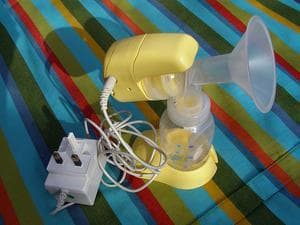Advertisement
Breastfeeding Battle Heard In Mass. High Court

In 2007, Sophie Currier of Brookline, holder of M.D. and PhD degrees from Harvard, asked for extra time to take an all-day medical board exam. Her daughter was four months old at the time and exclusively breast-fed, and she needed more than the standard 45 minutes of total break time to pump her breast milk. The test's overseers, the National Board of Medical Examiners, said no.
The conflict has wended its way through the legal system since then, and late last week reached the Massachusetts Supreme Judicial Court. (Here's my original front-page story back when I was at the Globe, the New York Times version and an update when Dr. Currier brought suit.)
You can watch the half hour of arguments before the SJC online here by clicking on "View oral argument with Windows media player." As the hearing opens, Dr. Currier's lawyer, Marisa Pizzi of Bowditch & Dewey, begins:
jcarter/flickr'Today this court has the opportunity to level the professional playing field for nursing mothers striving to balance blossoming careers in medicine with their family obligations. Since the outset of this case in 2007, Dr. Currier has sought only one simple thing: To give nursing mothers who are physicians in training the extra break-time they need during the US Medical Licensing Exam, known as the USMLE, to express milk for their young babies in a safe and sanitary fashion during the course of the exam."
The lawyer for the medical board, Joseph Savage Jr., argues the opposite: "If you follow their logic," he tells the justices, "the one thing that will happen as a result of their argument is an unleveling of the playing field. If every applicant for the test who has a gender-related physical condition that requires additional time is allowed a modification of the test, you will have a disparity. For example, if a woman comes in and says, 'I need additional time because I have cancer treatments for my thyroid,' and a man taking the test says, 'I need additional time because I'm having cancer treatments for my prostate,' we would be required under their logic to give the man additional time and not the woman."
For background: The medical board policy is to make testing accommodations only for disabilities recognized under the federal Americans with Disabilities Act. Breastfeeding does not count as a disability. (The board did allow Dr. Currier to take the test over two days instead of one because of ADHD and dyslexia, both recognized under the ADA, but that does not affect the crux of the legal arguments.)
The justices grill both sides, and if you watch the video, I'd be interested to hear whether you think they lean in one direction or another. At one point, Joseph Savage argues: "We deny everybody equally. We give men and women the same standard."
One justice counters: "But the consequence of that is a sub-class of women who have 45 minutes less to do what the class of men generally can do."
Mr. Savage responds: "Some classes of men have less time too. The guy who has Irritable Bowel Syndrome, whoever that day has a problem."
Yes, another justice responds, but "there is a class or sub-class of women — every lactating mother is presumably going to be in this situation."
I'll leave the relative merits of the legal arguments to the expert justices, who are likely to issue a decision in the coming months. But I'd like to point out what to me has always been the salt of this case: This is a medical board that declined to provide a nursing mother some extra support. These are doctors, who are likelier than any other profession to understand the importance of breastfeeding — and the potentially nasty consequences of failing to pump in a timely fashion. But they said no.
Marisa Pizzi: "This puts a nursing mother like Dr. Currier in a really untenable position. The coercion, if you will, is that she's forced to make a choice essentially between breastfeeding, which is her right, and pursuing her career as a physician. If she takes the exam with the standard break-time in order to pursue her medical career, she'd have to abandon or significantly compromise her right to breastfeed as well as her own health, because the test conditions do not allow for the full opportunity to express breast milk."
One of the justices asks: "Let's say you win. You persuade us. Does that mean in the future, that a mother who's nursing could — say she's going to take the bar exam — say, 'I need extra time. I'm nursing. Or some other kind of evaluation, whatever it might be — 'I need this time, I'm entitled to it, it's my fundamental right'?
Other tests could be assessed on a case-by-case basis, Marisa Pizzi says, but yes, "We do maintain that it is a fundamental right."
Post-script: One of the justices commented that the case is essentially moot, because Sophie Currier has already passed the exam; but Marisa Pizzi maintained that the court's decision will still be legally important. It certainly seems important for nursing mothers taking the exam in the future...
This program aired on December 12, 2011. The audio for this program is not available.
